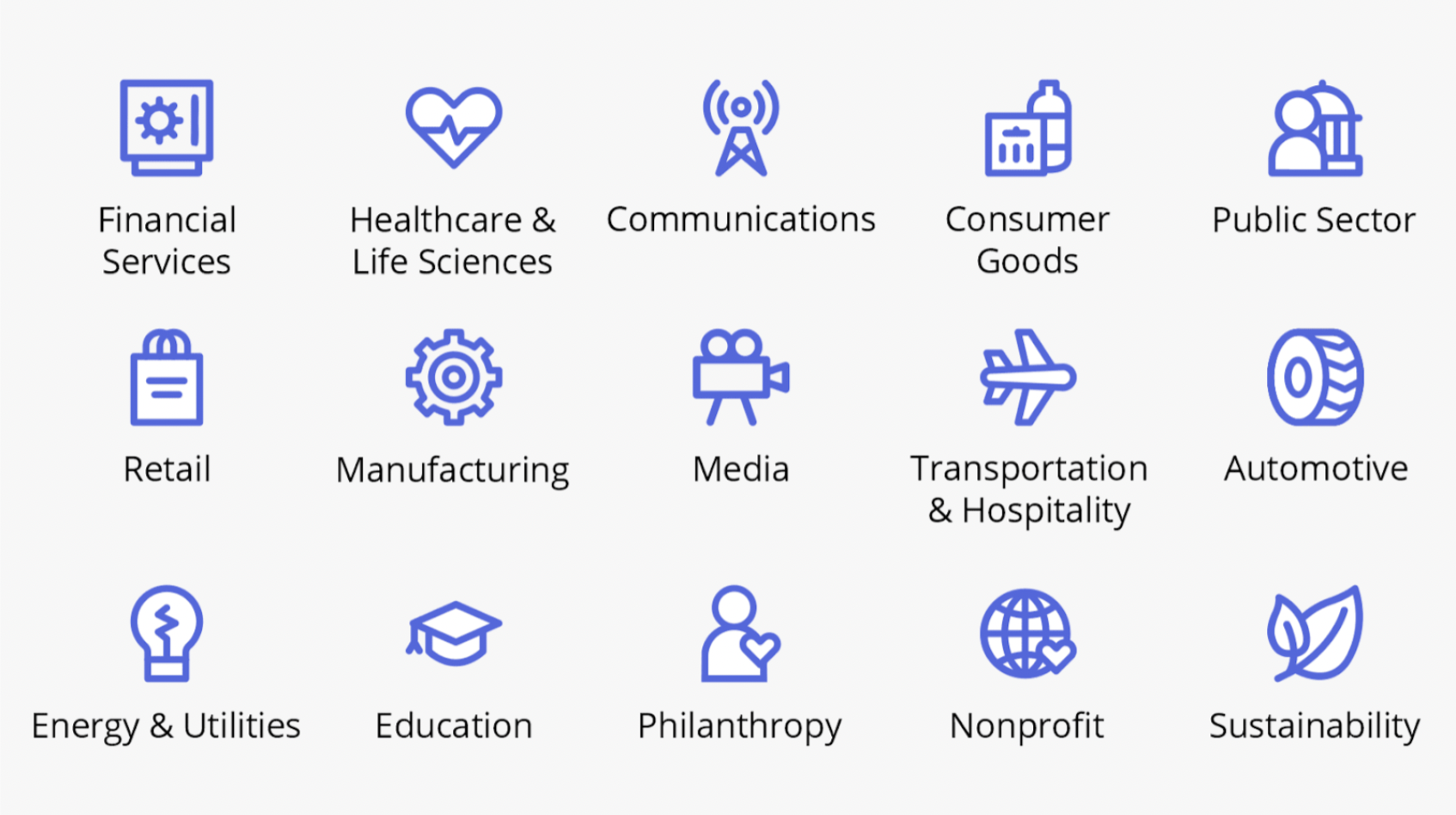Vlocity (Salesforce Industries) offers pre-built solutions on the Salesforce platform that solve the needs of particular industries. Vlocity takes these common requirements and packages them into “cloud” solutions that can be deployed to individual organizations.
Any company seeks to get the maximum ROI from its Salesforce implementation in the quickest time possible. Yet, implementation projects and further customizations generally seem never-ending, especially for industries that require CRMs that are heavily customized beyond the Salesforce that comes “out-of-the-box”.
There’s a decision that every organization faces: do we customize Salesforce in-house or choose Salesforce Industries solutions? Let’s address this question, plus the tools available to development teams (OmniStudio), as well as some examples of Vlocity solutions.
What is Vlocity?
Vlocity (Salesforce Industries) offers pre-built solutions on the Salesforce platform that solve the needs of particular industries that require CRMs to be heavily customized beyond Salesforce in its out-of-the-box state.
Founded in 2014, Vlocity quickly gained force as an “industry cloud” pioneer with three Forbes Cloud 100 awards in 2017, 2018, and 2019. What helped them achieve such rapid success?
Vlocity applications (built on the Salesforce platform) solve the needs of particular industries, such as Communications, Insurance, Energy & Utilities, Financial Services, Media, Health, and Public Sector with omnichannel sales, marketing, service, and CPQ solutions.


The key to success is simple. Companies benefit from ready-made flows and pre-built processes that otherwise would take months (and millions) to custom-develop.
In 2020 Salesforce acquired Vlocity. As a result of the transaction, Salesforce was able to add Vlocity’s industry-specific CRMs to its existing products, known as Salesforce Industries.
After this rebranding, Vlocity’s founder David Schmaier retained the post of CEO of Salesforce Industries, the business division in charge of creating clouds for new verticals.
What is Salesforce Industries?
The acquisition of Vlocity gave Salesforce a leg up on new vertical solutions. Broadly speaking, the 12 current industry clouds make headway in the Vlocity applications. These expand the existing Salesforce data model and provide out-of-the-box solutions that speak the language of their industry.
For example, two widely-adopted “clouds” are:
- Media and Communications Clouds: Organizations get all the required tools and applications to launch subscription services, manage orders, quotes, and contracts in an agile way.
- Financial Services Cloud: Supports banking, wealth management, and insurance markets by providing a unified platform with a single customer view of their policies, financial records, and claims.
These clouds improve sales, service, and marketing agility, as well as operational efficiency, while reducing time to value.
How Does Salesforce Benefit from Vlocity?
This partnership made industry-specific solutions a core element of the platform’s capabilities.
Over the years, Salesforce has been improving its agility, aiming to fit any industry challenge. Nonetheless, one obstacle remains unsolved – and that is IT complexity.
Imagine an enterprise with a complicated tech stack, including some home-grown applications. Replacing it with a consolidated platform still requires a lot of time and money. Consultants and developers need to customize the solution, align, and integrate applications to support end-to-end business processes.
That’s where Vlocity enters. Vlocity complements Salesforce with enterprise product catalog (EPC), CPQ, order management, and digital commerce, as well as pre-built processes and product models. The software is built in close conformance with common industry standards, promulgated by organizations like TM Forum and the MAF.
As a result, companies go live faster. They get their staff trained and may become self-sufficient, avoiding unnecessary costs on a bunch of consultants and developers.
How? Thanks to its user-friendly customization functionality called OmniStudio.
OmniStudio Overview
OmniStudio is a modular system with standard click-based components to quickly build Salesforce flows and solutions.
OmniStudio Architecture consists of three layers:
- Digital Experience
- FlexCards summarize and display contextual data and actions, both from Salesforce or third-party systems.
- OmniScripts let you configure sequences for sales, services paths, and other business processes.
- Service Management
- DataRaptors serve for retrieving, transforming, and updating data.
- Integration Procedures allow you to retrieve information from third-party services.
- Developer Experience
- IDX Build Tool for managing OmniStudio Datapacks.
- IDX Workbench is a desktop application for migrating Datapacks and Salesforce metadata.
As a result, unlike custom development, with OmniStudio, you get easy shortcuts and more reuse opportunities to adapt industry-oriented solutions to your own requirements.
Industry clouds are evolving and undergoing changes. Currently, though, you need to mind some possible drawbacks:
- Industries combine many clouds into one common functionality. Due to this, it is hard to understand if a particular feature belongs to the current implementation.
- Releases do not have a clear structure, as all clouds and APIs receive updates in one package.
- Limited support for bugs and platform limitations.
- The Vlocity data model and functionality is best suited for enterprise-level businesses. Some would say that it’s overkill for the SMB market, as not only is a larger budget required, small-medium businesses are likely to be left with functionality they don’t need, and won’t use.
Is Vlocity a CPQ?
Vlocity offers a number of built-in components that give a new spin to traditional processes, including CPQ.
Vlocity CPQ (now Industries CPQ) is one of the platform’s components. It helps automate the quote generation process and sales flows.
What functionality does it have?
- Automation rules for configuring products.
- Quote approvals, complex pricing.
- Industry-focused approach.
- Templates for designing documents and quotes.
- Enterprise Product Catalog (EPC) to configure and manage CPQ in one place.
- Guided selling, contract lifecycle management.
Summary
To sum up, Vlocity made a breakthrough, providing companies with an architectural foundation fit for specific industries. Its acquisition by Salesforce marked the company’s shift to industry-specific solutions that are easier to customize, and faster to be onboarded by users. The existing Salesforce Industry clouds provide companies with a flexible data model, and a stable instance with reusable solutions inside for a faster digital transformation journey.


Comments: